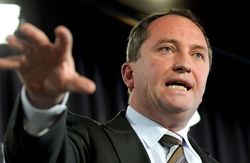
“I just don’t want to see agricultural land owned by foreign governments,” says Australia's Agriculture Minister Barnaby Joyce.
Barnaby Joyce draws line in the soil on foreign farm buyers
by Sue Neales
Barnaby Joyce supports banning all foreign governments and foreign state-owned companies from buying Australian farmland, saying such acquisitions could “undermine the national interest”.
In a surprise move, the Agriculture Minister has backed calls for a veto on other nations being allowed to buy vast areas of productive farmland, drawing a distinction between private investment by overseas-based companies and purchases by foreign countries or their entities.
He said he had no trouble with private foreign companies buying farms, agribusinesses or food processing assets because they “come and go” depending on the financial returns they earn.
“I just don’t want to see agricultural land owned by foreign governments,” Mr Joyce said.
“The land we stand on is intrinsic to our values and identity as a nation. I wouldn’t want to see Australian farmland become under the control of the government of another nation.”
The issue has come to a head as the prized SK Kidman empire of 10 massive cattle stations — put together by the legendary “Cattle King” Sir Sidney Kidman in the 1890s — is placed on the market with a price tag of about $350 million. Several foreign government-owned companies are among the 30-plus bidders that have expressed early interest in acquiring the iconic cattle and beef business, which includes 185,000 cattle and the world’s largest cattle property, Anna Creek Station, on the edge of South Australia’s Lake Eyre. The properties cover more than 100,000sq km of land from Queensland to South Australia.
In its first three months in office, the Abbott government controversially vetoed the $3.2 billion purchase of Australia’s biggest listed agribusiness, GrainCorp, by US private global trading giant Archer Daniels Midland on “national interest” grounds, despite a favourable recommendation from the Foreign Investment Review Board.
Backing a call at the NSW Nationals state conference in Cessnock at the weekend for the party to specifically “oppose” the sale of Kidman and Co to a foreign state-owned enterprise, Mr Joyce spoke strongly in favour of the motion.
Mr Joyce confirmed to The Australian yesterday that he had supported the blocking of any Kidman sale to a foreign-government company.
But he said his opposition was broader, and not just confined to the specific Kidman group of cattle properties, with a clear distinction, in his view, between foreign companies investing in Australian farms and food businesses, and foreign governments or state-owned enterprises doing the same. “This isn’t xenophobia; this is exactly what other countries do — no other government can buy land in China or Indonesia, for example, ” Mr Joyce said. “It’s different when it is a genuine foreign company or individual investing; they will make their decisions whether to buy land and then stay in (Australian) agriculture or not based on the returns they earn.
“But a foreign government has a more long-term purpose (in buying farms), which could over the long run undermine our nation’s interests.”
A spokesman for Mr Joyce later told The Australian the minister did not believe a government ban on rural land purchases by foreign governments would lower the value of farmland.
“There is so much money sloshing around the world looking for a home and Australian agriculture is such an attractive proposition to so many, that it wouldn’t have much of an impact at all,” Mr Joyce’s spokesman said.
The motion at the Nationals conference was passed resoundingly, with NSW Nationals senator John Williams also supporting the ban on any foreign government acquisition of the 10 Kidman cattle stations.
But the Nationals chief whip, and federal MP for Parkes, Mark Coulton did not share the view that foreign-government investment was so undesirable, speaking against the motion from the conference floor.
Under FIRB rules, any company or fund with more than a 15 per cent stake owned by an overseas government or public entity is classified by FIRB as foreign-government-owned.
FIRB approval — and eventually the Treasurer’s own tick — is now required for any foreign company buying parcels of farmland valued at more than $15m in total, while all foreign government-entity acquisitions must be approved by regulators.
Mr Joyce’s office said his support at the Nationals conference for the veto on a foreign government making a grab for the Kidman stations did not necessarily mean Mr Joyce would now lobby Treasurer Joe Hockey to block any such deal.
The NSW Nationals state conference was the first time Mr Joyce had publicly made clear the distinction he sees between general private foreign investment in agriculture and acquisitions by other nations’ governments or state-owned bodies.
Don Manifold, head partner of Adelaide accountancy firm EY, which is managing the Kidman cattle business sale on behalf of its 50 extended family owners, said enormous interest had been shown in purchasing the property.
He was confident a top price would be secured regardless of any changed government position on acquisitions by state-owned enterprises. Mr Manifold said he was aware of the NSW Nationals motion calling for the federal government to stop the sale of the Kidman group to a foreign government-owned enterprise. But, he said, the issue remained “very hypothetical’’ at this early stage.
Mr Joyce supports private foreign companies developing Australian farmland and agriculture. Chinese company Zhongfu is clearing bush and building irrigation for farms and sugar mills in the Ord Valley in the remote east Kimberley of Western Australia.
But he is less in favour of acquisition of farms by foreign companies that hold on to them in the hope of increases in land value or use them to process food for markets in their home countries.













